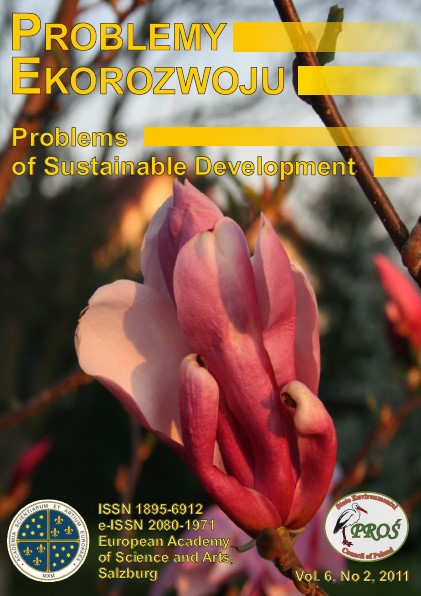Douala – a City of Lost Hopes? Consequences of Decolonisation in Africa versus Sustainable Development
Article Sidebar
Issue Vol. 6 No. 2 (2011)
-
A New Journal’s Fifth Anniversary: Problemy Ekorozwoju/Problems of Sustainable Development
Yucheng Cao7-10
-
Europe 2020 Strategy and European Recovery
Erich Hoedl11-18
-
Ethics in Industrial Ecology
Martina Maria Keitsch19-31
-
Human Progress Towards Equitable Sustainable Development – part II: Empirical Exploration
Victor Udo, Artur Pawłowski33-62
-
Interpreting Sustainability Using Robert Pirsig’s Levels of Quality
G. Venkatesh63-66
-
Simple Living and Sustainable Consumption
Jakub Kronenberg, Natsuyo Iida67-74
-
Sustainable Development – How to Recognize Integrated Order
Tadeusz Borys75-81
-
Dimensions of Ecological Discourse – Overview of Problems and Selected Literature
Lech W. Zacher83-92
-
The Picture of Sustainable Development in “Problemy Ekorozwoju/Problems of Sustainable Development” Journal
Ignacy S. Fiut93-100
-
Theoretical Basis and Implementation of the Idea of Sustainable Development in Forestry
Piotr Paschalis-Jakubowicz101-106
-
Douala – a City of Lost Hopes? Consequences of Decolonisation in Africa versus Sustainable Development
Marta Dorenda-Zaborowicz101-106
-
Spatial Environmental Services in the Approach of the Assumptions of Economics for Sustainable Development
Artur Michałowski117-126
-
Subjective Areas of Life Quality for People in Different Situa-tion in the Context of Sustainable Development
Anna Rożnowska127-140
-
Protection of Genetic Resources of Farm Animals in the Context of Sustainable Development
Karolina Szulc127-140
-
Ecological Education in Waste Management as a Tool for The Implementation of Sustainable Development
Małgorzata Pawul, Wiktoria Sobczyk147-156
-
Educator of Sustainable Development as the Response to the Need of Sustainable Society Education
Ewa Gajuś-Lankamer, Anna Maria Wójcik157-164
-
Book Review: J. Ikerd, A Revolution of the Middle… and The Pursuit of Happiness, on-line audiobook
Lucjan Pawłowski165
-
Book Review: J. Kurowicki, Estetyczność środowiska naturalnego/Ecoaesthetics of the Natural Environment
Andrzej Papuziński165-167
-
Communiques of the State Environmental Council of Poland
Work Plan 2011 9th Plenary Meeting of PROSTomasz Winnicki169-170
Archives
-
Vol. 8 No. 2
2013-07-01 13
-
Vol. 8 No. 1
2013-01-02 12
-
Vol. 7 No. 2
2012-07-02 14
-
Vol. 7 No. 1
2012-01-02 12
-
Vol. 6 No. 2
2011-07-01 19
-
Vol. 6 No. 1
2011-01-03 18
-
Vol. 5 No. 2
2010-07-01 21
-
Vol. 5 No. 1
2010-01-04 16
-
Vol. 4 No. 2
2009-07-01 19
-
Vol. 4 No. 1
2009-01-05 22
Main Article Content
Authors
Abstract
One of the most important consequences of decolonisation is instability of political systems in post-colonial States, which evokes further results. Amongst them there are deep economical problems, hampering development and deepening the disproportions between Northern and Southern part of the world. These disproportions are marked the most in Africa. The continent experiences an exceptionally significant problem – rapid urbanisation. The cities expand and the suburbs are inhabited by the citizens of very low income, therefore their quality of living is extremely low as well. Fulfilling basic human rights, such as access to education, healthcare or clean water becomes the problem. The system of social care does not exist, whilst family traditions, which had been replacing it for several years, have been expelled by eastern-European model of city life – atomisation, focus on income, concurrence. Regardless of the region of Africa, similar problems appear in almost all the big cities on its territory.
Keywords:
References
BANK ŚWIATOWY, 2004, Poverty and Urban Mobility in Douala. Final Report, http://www4.worldbank.org.afr/ssatp/Resources/Paper Notes/Douala_en.pdf.
BROOKE J., 1987, Informal Capitalism Grows in Cameroon, in: New York Times, nr 31, s. 21-22.
Colloque Villes et économie informelle, Bamako 2002, http://www.aimf.asso.fr/upload/uploads/File/economie_informelle/155320_douala_rues_pietonnes.pdf.
ELATE S. S., African Urban History in the Future, w: Globalization and Urbanization in Africa, red. Salm S., Falola T., Africa World Press, Trenton 2004, s. 54-62.
GAWOR L., 2010, Filozofia zrównoważonego rozwoju – preliminaria, w: Problemy Ekorozwoju/Problems of Sustainable Development, vol. 5 no 2, s. 69-76.
GURTOWSKI S., Green Economy Idea – Limits, Perspectives, Implications, w: Problemy Ekorozwoju/Problems of Sustainable Development, vol. 6 no 1, s. 75-82.
HUETING Z.R., Environmentally Sustainable National Income, w: Problemy Ekorozwoju/Problems of Sustainable Development, vol. 6 no 1, s. 31-56.
KOWALCZAK P., Urbanizacja a problemy wodne miast z perspektywy miast krajów rozwijających się, http://kropla2010.eko.org.pl/index.php?dzial=2&kat=10&art=10&limit=0.
LAMBI C. M., HOMBE L. F., Environmental Hazards and Landuse Planning for Sustainable Development: the Douala Unstable Coastal Region, w: Instability: Planning and Management, red. Macinnes R. G., Jakeways J., Thomas Telford, London 2002, s. 118-134.
PROKOPCZUK J., Historia Afryki w zarysie, PZWS, Warszawa 1964.
REDCLIFT M.R., 2009, Sustainable Development, in: Problemy Ekorozwoju/Problems of Sustainable Development, vol. 4 no 1, s. 33-50.
ROGERS, S. The Top 50 most expensive cities, “Data Blog”, http://www.guardian.co.uk/news/datablog/2009/jul/07/global-economy-economics, 2009.
ROSZKOWSKI W., Półwiecze. Historia polityczna świata po 1945 roku, WSiP, Warszawa 2005.
SANCHÈZ A., 2008, Perspectives and problems in Sustainable Development, in: Problemy Ekorozwoju/Problems of Sustainable Development, vol. 3 no 2, s. 21-23.
SIMONE A. M., For the City Yet to Come: Changing African Life in Four Cities, Duke University Press, Durham 2004.
SZYMAŃSKI B., Dekolonizacja Afryki, http://historia.gazeta.pl/historia/1,98741,6518094,Dekolonizacja_Afryki.html
TUZIAK A., 2010, Socio-Economic Aspects of Sustainable Development, in: Problemy Ekorozwoju/Problems of Sustainable Development, vol. 5 no 2, s. 39-49.
Article Details
Abstract views: 84
License

This work is licensed under a Creative Commons Attribution-ShareAlike 4.0 International License.


